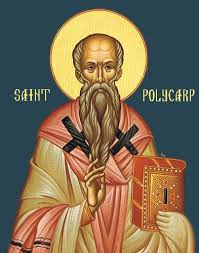HOMILY LENT WEEK 01 02 – Year I
The Word That Transforms:
Optional Memorial of St. Polycarp
(Is 55:10-11; Ps 34; Mt 6:7-15)
******************************************
“My word shall not return empty, but it shall accomplish that which I purpose and succeed in the thing for which I sent it.”
This phrase spoken to the world by God through the prophet Isaiah raises two questions for us to consider: What is it the word came to accomplish, and are we really getting that message?
Jesus, as the Word made flesh and the long-awaited Messiah, came with a two-fold mission – to redeem and to sanctify, to forgive and to heal. Our response is to believe this – to repent, receive his forgiveness for our sins and wrongdoing, and turn to him for healing of our sinfulness, painful emotions, character defects and addictions. Are we doing this? Pope Francis insists God never tires of forgiving us – we are the ones who neglect to do our part, to repent and come to God for that gratuitous forgiveness and healing.
The gospel about the Our Father reminds that we are to be about helping to build the kingdom of God that Jesus came to establish by his two-fold mission. What exists in heaven now, is meant to begin to exist here on earth. We do that by letting go of our stubborn self will, and being open to doing the will of God. Our task is to be the person God wants us to be; to let God do in us what God wants to do, and then to do whatever God wants us to do.
To be forgiven our debts is to learn to apologize to God and others for anything we have done wrong. An apology involves listening to the pain of the other; humbly asking for forgiveness; making a declaration to change our ways, and then trying to make right what we have wronged by some amends.
We are also to forgive those who have hurt us from the heart; to let go of any desire for revenge or punishment. We do that by sharing our feelings of hurt with them instead of acting out of our hurt feelings, and end by simply saying we are trying to forgive them.
Finally, the time of trial is not temptation as such, but rather the experience of the apparent absence of God that Jesus experienced on the Cross, and that Mother Theresa of Calcutta experienced for all the time she was doing her ministry in India. That test is given to those whose faith is strong enough to bear it. We pray that it not come our way, or if it does, that this desolation comes in small doses, and that we will have the understanding and strength to bear it without bitterness or resentment, as Jesus did.
I think the best translation of the Our Father for us today, when there is some controversy about this, is to simply say, “Lead us not into the test,” the test being that experience of the apparent absence of God described above.
 The Church today honours St. Polycarp. Polycarp is one of the Fathers of the early Church, and his letter to the Philippians is one of the early pieces of Christian writing in existence today. A disciple of the apostle John, he was a leader of the second generation of Christians, the first Christians who were not eyewitnesses to the death and resurrection of Our Lord. Extremely influential in the catechesis and initiation of new Christians, he was named bishop of Smyrna, located in modern-day Turkey. Polycarp was martyred for his faith about the year 155, at the age of 86. He is a patron of those suffering from earaches.
The Church today honours St. Polycarp. Polycarp is one of the Fathers of the early Church, and his letter to the Philippians is one of the early pieces of Christian writing in existence today. A disciple of the apostle John, he was a leader of the second generation of Christians, the first Christians who were not eyewitnesses to the death and resurrection of Our Lord. Extremely influential in the catechesis and initiation of new Christians, he was named bishop of Smyrna, located in modern-day Turkey. Polycarp was martyred for his faith about the year 155, at the age of 86. He is a patron of those suffering from earaches.
The Eucharist is an experience of the Word of God coming to us and accomplishing what it was meant to do – become an intimate part of our core being, through word and sacrament, forgiveness and healing.
May our celebration deepen our faith in God’s love for us, lead us into a deeper experience of God’s forgiveness and healing through Jesus, and empower us to share that message of Good News with the world.



